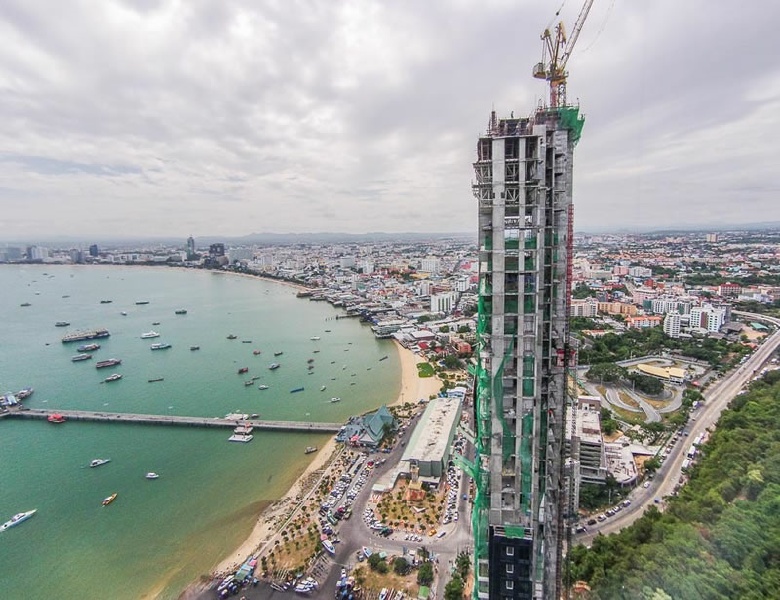Investing In Off Plan Property in Thailand – What Are my Risks and How Do I Maximize my ROI?
Purchasing property in a foreign country for the first time can be a scary thought, and requires some research to understand rules, regulations and restrictions to foreigners who want to buy. If you are considering buying or investing in an off-plan property in Thailand, even more due diligence is required before you jump in.
Investing in an off-plan property in Thailand can have huge advantages. If you buy early in the process, you have the widest selection of choices and can generally get the positioning and design that best matches your requirements.
And for the most part, prices only go up, so buying when a project is initially launched or is under construction will ensure you get the best price and lock in on the best possible return on investment.
To take advantage of this benefit, however, there are elements of risk which you need to consider and accept. And with my background in finance, I know a few things about risk management. Projects can and do fail, so you need to consider whether you are willing and financially capable of losing funds committed to the property. You need to carefully consider your risk tolerance. But read carefully and you can significantly mitigate your risk.
Know the Developer
Before committing funds to a new project, consider the following factors:
- Is the developer reputable with a track record for delivering what they promise and completing on schedule? Specifically, what other construction projects have they done in Thailand?
- Does the developer own the land free and clear? Ask for a copy of the “Chanote” (title deed) to the land.
- Have you verified that required permits and approvals have been obtained? If not, what is the status of the approval process?
- How is the project financed? Is the developer using their own funds, are they funded by a bank or private investors, or are they relying on cash flow from project sales?
- Is the overall design and scale of the project appropriate for the chosen location?
- Has the developer clearly documented the building specifications, unit specifications, and amenities included in the project? The Condo Act requires developers to build based on specifications in contracts and marketing materials.
- What firm has been hired to do the construction? What is their relevant experience?
- If construction has already commenced, what is the actual progress compared with the original schedule? Are there any significant delays?
Tips for Contract Review & Negotiation
Once you have a comfort level with the overall project plan and are confident the developer is positioned to deliver, there are several factors to consider when reviewing and negotiating the contract, including the following:
- If you intend to purchase under the “foreign” quota, does the contract clearly stipulate that the property will transfer in your name?
- What is the payment structure? Contracts which require smaller payments prior to completion and transfer are preferred. Those developers requiring larger payments during construction may be relying on your funds to complete the project.
- What happens if there are significant delays with project completion? Are penalties imposed on the developer? Can I get a full refund if I choose to do so?
- Do I have unrestricted rights to resell my contract prior to completion? What is the fee charged by the developer to transfer my contract to a new buyer?
- Make sure the floor plan is included as part of the contract. A provision with fluctuation in size of the unit per the floor plan compared with the completed property should be addressed. The tolerance is normally no more than +/- 5%.
- Who pays the transfer taxes, including specific business tax, land transfer tax, and stamp duty?
- How much is the sinking fund and annual maintenance?
- Are there other one-time acquisition costs, such as paying for parking, water & electric meters, etc.?
- Make sure the contract is clear about specifically what is included in your unit, such as built-in kitchen, fitted bath, air conditioning, appliances, furniture, electronics, etc.
- The contract should clearly define what communal areas are included and it should be clear that condo residents have the right to use all communal facilities.
Manage your currency risk
If you purchase an off plan real estate project in Thailand, you will be sending foreign currency to Thailand over an extended period, as long as several years depending on the scale of the project and depending on when you purchase. Currencies fluctuate daily, and there is inherent risk associated with this. Although you can transfer the full amount of currency to your Thai account when you sign the contract, this will likely have an adverse effect on your investments.
You should plan with a financial advisor who is familiar with hedging currency risk to help you develop a strategy that works best for you.
Property as an Investment
Remember that all property purchases are an investment, and because of the cost involved, it is normally a sizeable portion of one’s overall investment portfolio. When buying into a new project, make sure you do a thorough financial analysis to calculate all your acquisition costs, including initial fit-out and furnishing of the condominium. After all, if you don’t understand your cost basis, you cannot calculate an accurate return on investment (ROI).
When forecasting your rental income be sure to use conservative estimates which you can verify at least by analyzing list rental prices for similar units in the area you are considering buying. And remember that Pattaya can be prone to seasonal demand, so ensure you use a vacancy rate that is realistic.
Before you can finalize an accurate ROI calculation, consider all of your operating costs. These include common area maintenance, interior maintenance, repair and replacement of furniture and electronics, property management fees, rental commissions, contents insurance and any other costs. When purchasing an “off-plan” project in Pattaya, you should be able to achieve at least an 8% ROI if you purchase the right property.
How do I Choose the Best Property?
Where every developer sincerely believes their product is the best and you should buy their latest launch, you will be well served to select a real estate professional to help you negotiate the best price, terms & conditions. The best agents are “agnostic” when it comes to specific developers or projects, and will answer all your questions fully and accurately. They will be candid about potential risks and draw-backs and not try to sell you on a single option. They will also make sure you have all the acquisition and maintenance cost details and realistic rental forecasts so you can determine if “the math works”.
At the end of the day, purchasing a property still has a high degree of emotion attached to it, even if the primary objective is to invest in off plan property in Thailand. So you need to weigh in on what is important to you aesthetically, emotionally. Risk management and financial analysis are important aspects of making an informed decision, but you also need to feel good when you tell your friends and family about your decision.


Recent Comments